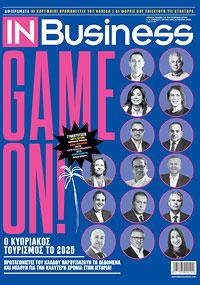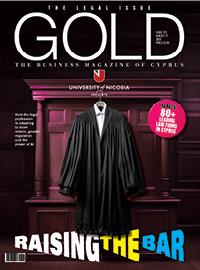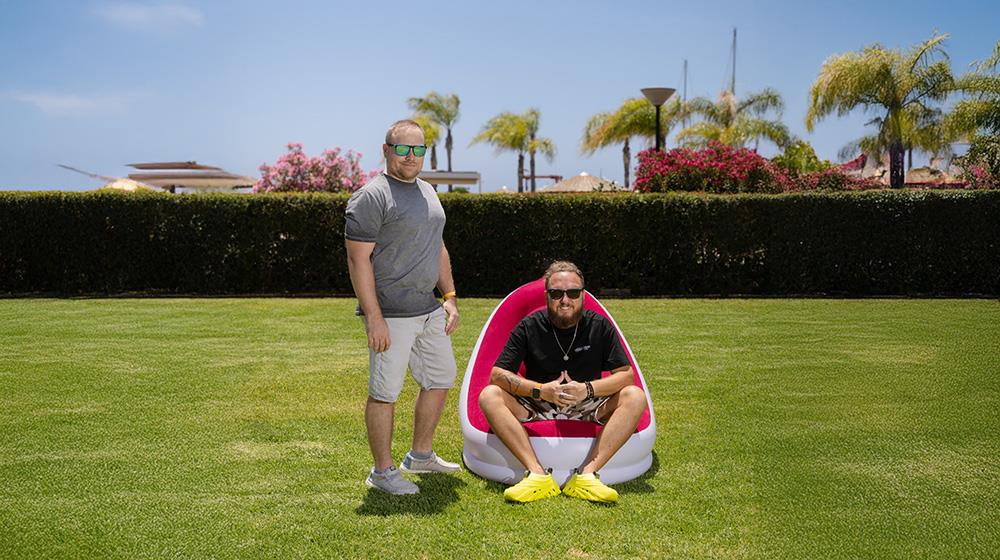For Andrey Ivashentsev and Tim Fadeev, co-founders of Game Developers Cyprus (GDCy), Limassol’s popularity as a hub for video games – and other industries – has been a double-edged sword, eventually making it one of the most expensive places to live.
From schools to road works, the co-founders explore what the city needs to do to capitalise on its strong work-life balance and rich culture. Ivanshentsev is pictured above on the left (standing), and Fadeev on the right (sitting).
Cyprus is now home to around 2,000 game developers, with Limassol emerging as the natural centre for meetups, events and investments. What is it about the city that makes it so attractive to the industry?
Andrey Ivashentsev: Limassol has established itself as a seaside business hub, which is one of the main reasons why many game development companies choose to open offices here instead of in Nicosia. After all, relocating to an island surrounded by the sea, only to live an hour away from the beach, would feel a bit odd! Naturally, Limassol became the top choice. Over time, it became clear that a professional community was forming, attracting even more companies interested in hiring qualified talent. In turn, professionals started moving closer to the offices of their potential employers. This mutual attraction between talent and opportunity has made Limassol increasingly popular – and also one of the most expensive places to live in Cyprus!
Could you give us a snapshot of the studios based in Limassol? What types of games are being built, which platforms dominate, and how do most teams operate: office-based, remote, or hybrid?
Tim Fadeev: Limassol has become home to a very diverse range of gaming studios. While the majority of companies here are focused on mobile gaming, there’s a noticeable push toward PC and console development as well. I personally know a few teams that are already deep into building titles for those platforms. We have major players like GDEV and Nexters with a strong presence in the city, alongside mid-sized studios like Helio Games, which has a fully operational office here staffed with all kinds of professionals – from designers and developers to marketing and analytics teams. That said, many companies still operate in a distributed model. Limassol often serves as a satellite or HQ office, with core development teams based in more cost-effective regions. So, while you’ll find full-scale operations here, the hybrid or remote-first approach is still quite common.
As the voice of the local developer ecosystem, what are GDCy members saying about life in Limassol – the pain points and the perks?
Andrey Ivashentsev: As I mentioned earlier, Limassol has become very expensive to live in, especially when it comes to housing. Both renting and buying homes, as well as office spaces in business centres, can cost a lot. At the same time, many expats – not just from the game development industry – have moved to Cyprus with their families. This created a high demand for international schools and preschools. Since children who don’t speak Greek can’t attend public schools, they need at least an English-speaking education. But spots in these schools are limited, and the number of schools isn’t growing fast enough to meet the demand. Most international schools, like Heritage, The Island and Pascal, are located outside the city, which causes heavy traffic in the mornings as parents drive their kids to school. Over the years, families have gotten used to this. On the bright side, Limassol offers a good work-life balance, a rich cultural life and fun community events like ours, where people can enjoy their free time.
Many studios in Limassol began as relocations and some of their former team members have since launched their own ventures. How would you describe this new wave of founders and how well are they connecting with the local community and culture?
Tim Fadeev: I wouldn’t say there’s a full-on wave just yet – maybe more of a ripple! There are definitely a few promising startups and indie studios popping up but, to be honest, Cyprus isn’t the easiest place for young companies to take root. Limassol, in particular, is better suited for well-established studios with strong financial foundations. The tax benefits, programmes like the IP Box and overall business infrastructure are excellent but the high cost of living makes it tough for early-stage teams to thrive here. That said, I’m encouraged by the steady growth of our community. At our monthly GDCy networking events, I meet new faces all the time – people I’ve never seen before, which is a great sign. It means more and more folks are choosing Cyprus to build their careers and future, even if the startup ecosystem still has room to grow.
Other cities are competing hard for tech talent with better infrastructure and incentives. What needs to improve – digitally, educationally or at the policy level – for Limassol to stay competitive as a game development hub?
Andrey Ivashentsev: This is mostly about the key factors that people consider when choosing where to live. Many game developers can work remotely and the COVID lockdowns proved this even to the biggest sceptics. That’s why lots of professionals with flexible jobs are now moving to quieter, more rural areas and only going to the office for important meetings. In this case, having a good internet connection becomes very important, so areas without fibre optics are much less attractive to remote workers. Paphos is also attracting businesses and people looking for a better work-life balance in a less crowded city. It offers many benefits – like food delivery, a friendly social atmosphere and even an airport – though it has fewer professional communities and events compared to places like Limassol. Still, with a much lower cost of living, Paphos can be a great place to start.
Fast-forward five years. What will success look like for Limassol’s video game industry?
Tim Fadeev: In five years, I’d love to see some major improvements in the city’s infrastructure, like better roads, more efficient public transport and, especially, progress on big projects like the coastal road and bus lanes. With Limassol’s population growing rapidly, the city needs to evolve just as quickly to keep up with demand. As for the industry itself, I actually hope we don’t keep everything concentrated in Limassol. Cyprus has so much more to offer. I’d like to see a more balanced spread of gaming studios across the island, in cities like Paphos, Larnaca and Nicosia. We’ve built something really special with GDCy in Limassol and I think it’s time to share that spirit. Launching GDCy branches in other cities would help build strong local communities and unlock even more potential across the country.
(Photo by Giorgos Charal)
This interview first appeared in the June edition of GOLD magazine. Click here to view it.









